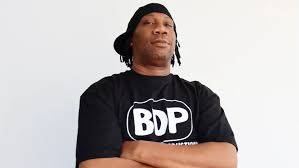KRS-One, born Lawrence Parker on August 20, 1965, in The Bronx, New York City, is an influential American rapper, educator, and activist known for his contributions to hip-hop culture and his commitment to social justice. Often referred to as “The Teacher,†KRS-One has been a prominent figure in hip-hop since the late 1980s, recognized for his thought-provoking lyrics, innovative style, and dedication to using music as a platform for social change.
Early Life
KRS-One had a challenging upbringing. He was born into a family struggling with poverty, and his father was absent for most of his life. After the death of his mother when he was just 16, KRS-One became homeless, living on the streets of New York. Despite these hardships, he found solace in hip-hop, which became an outlet for his creativity and a means of expression.
During his teenage years, KRS-One was introduced to the burgeoning hip-hop scene and began to explore his talents as an MC. He initially performed with a group called The Stop the Violence Movement, which aimed to address the violence in hip-hop and advocate for peace in the community.
Career Beginnings with Boogie Down Productions
In 1987, KRS-One formed the group Boogie Down Productions (BDP) with DJ Scott La Rock. Their debut album, Criminal Minded (1987), was groundbreaking and is often considered one of the seminal works in hip-hop history. The album addressed themes of street life, social issues, and self-awareness, showcasing KRS-One’s powerful lyrical abilities. Tracks like “South Bronx†and “The Bridge Is Over†became anthems in the genre, with “The Bridge Is Over†sparking a notable rivalry between BDP and Native Tongues, a collective that included influential artists like A Tribe Called Quest and De La Soul.
Tragically, Scott La Rock was murdered in 1987, a loss that profoundly impacted KRS-One and fueled his determination to use hip-hop as a vehicle for positive change. In the wake of this tragedy, KRS-One began to embrace his role as an activist, using his platform to promote social justice and raise awareness about issues affecting marginalized communities.
Continued Success and Evolution
KRS-One continued to release critically acclaimed albums throughout the late 1980s and early 1990s, including By All Means Necessary (1988), which featured hits like “My Philosophy†and “Stop the Violence.†This album further solidified his reputation as a socially conscious artist and a leader in the hip-hop community.
In the years that followed, KRS-One experimented with various musical styles while maintaining his commitment to addressing social issues. His 1993 album Return of the Boom Bap included tracks like “Sound of da Police,†which critiques systemic racism and police brutality, and “Black Cop,†which tackles the complexities of being a Black officer in a predominantly white system.
Education and Activism
Beyond his music career, KRS-One has been an outspoken advocate for education and social justice. He founded the Temple of Hip Hop, an organization aimed at promoting hip-hop culture as a tool for education and empowerment. KRS-One believes that hip-hop can be a force for positive change, and he has dedicated much of his life to teaching young people about the history and significance of the genre.
He has spoken at various colleges and universities, sharing his insights on hip-hop culture, history, and social issues. His passion for education is evident in his lyrics and public appearances, where he emphasizes the importance of knowledge and self-awareness.
Legacy and Impact
KRS-One’s influence on hip-hop is profound and far-reaching. He is often credited with helping to elevate the genre by emphasizing the importance of lyrical content and social consciousness. His dedication to addressing issues such as poverty, racism, and violence has inspired countless artists and fans.
Over the years, KRS-One has collaborated with numerous artists across genres, including Nas, Talib Kweli, and The Roots. His ability to adapt to changing musical landscapes while remaining true to his core principles has solidified his status as a hip-hop icon.
Recent Projects
In recent years, KRS-One has continued to release music, including albums like KRS-One (2004) and Survival Skills (2009) with Buckshot. He remains active in the hip-hop community, participating in events and lectures, and continues to advocate for social justice and education.
Conclusion
KRS-One’s journey from the streets of The Bronx to becoming a legendary figure in hip-hop is a testament to his resilience, talent, and commitment to using music as a platform for social change. His powerful lyrics, innovative style, and dedication to education have left an indelible mark on the genre. As he continues to inspire new generations of artists and activists, KRS-One remains a vital force in hip-hop, embodying the spirit of creativity, activism, and social awareness.



No comments yet
Be the first to share your thoughts!